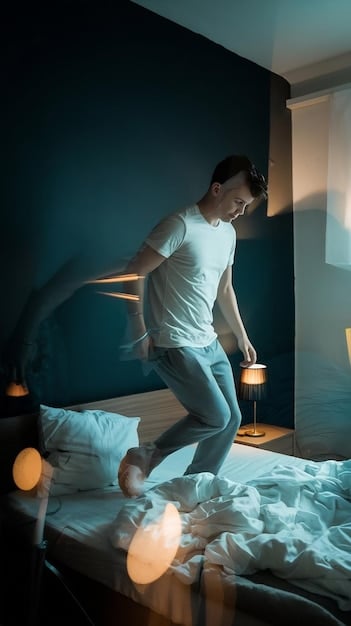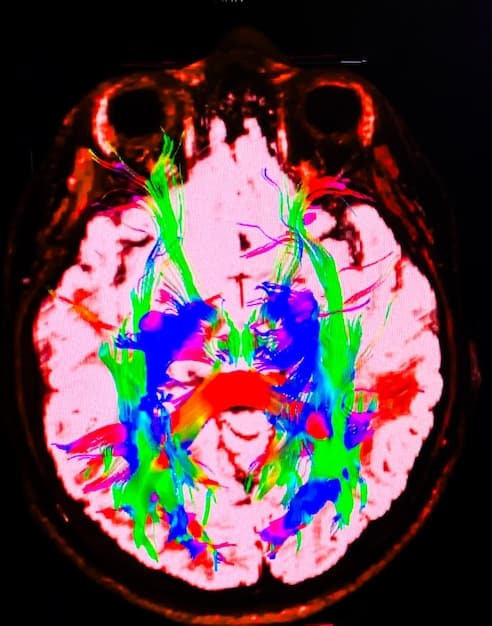Sleep Quality and Mental Health: New US Research Insights

Recent US studies highlight a significant link between sleep quality and mental health, revealing that poor sleep can exacerbate conditions like anxiety and depression, while improved sleep can lead to better mental well-being.
Are you waking up tired, even after a full night’s sleep? New research from US studies is shedding light on the profound connection between sleep quality and mental health, and the findings might surprise you. Discover how your sleep habits could be impacting your mental well-being.
Understanding the Sleep-Mental Health Connection
The relationship between sleep and mental health is complex and bidirectional. This means that sleep problems can contribute to mental health issues, and mental health issues can, in turn, lead to sleep disturbances. This creates a challenging cycle to break.
Recent studies in the US have started to unravel the intricate mechanisms behind this connection, offering insights into potential interventions and treatments. Let’s delve deeper into what these studies reveal.
How Sleep Deprivation Affects Mental Well-being
Sleep deprivation impacts various aspects of mental well-being, including mood regulation, cognitive function, and emotional processing. It can lead to increased irritability, difficulty concentrating, and heightened emotional reactivity.
The Role of Sleep in Mental Health Disorders
Mental health disorders like anxiety, depression, bipolar disorder, and PTSD are often associated with significant sleep disturbances. Research is exploring how these disorders disrupt sleep patterns and how improving sleep can alleviate some of the symptoms.
- Anxiety and Insomnia: Anxiety often leads to racing thoughts and difficulty falling asleep, resulting in insomnia.
- Depression and Sleep Disturbances: Depression can manifest as either insomnia or hypersomnia (excessive sleepiness), disrupting the natural sleep-wake cycle.
- Bipolar Disorder and Sleep: Sleep disturbances are a hallmark of bipolar disorder, with manic episodes often characterized by reduced need for sleep.
- PTSD and Nightmares: Trauma can lead to nightmares and flashbacks that disrupt sleep and contribute to ongoing mental health issues.
Emerging research indicates that addressing sleep disturbances can be a crucial component of treating mental health disorders, potentially improving outcomes and overall quality of life.
US Studies on Sleep Quality and Mental Health: Key Findings
Several recent US studies have contributed valuable data and insights into the link between sleep quality and mental health. These studies have employed various methodologies, including surveys, clinical trials, and neuroimaging techniques, to explore different facets of this relationship.
Here’s a look at some of the key findings from these studies, highlighting the impact of sleep interventions on mental health outcomes.

Impact of Sleep Interventions on Mental Health
One notable finding from these studies is the positive impact of sleep interventions on mental health outcomes. Cognitive Behavioral Therapy for Insomnia (CBT-I) has been shown to be particularly effective in improving sleep quality and reducing symptoms of anxiety and depression.
Association between Sleep Duration and Mental Health
Another key finding is the association between sleep duration and mental health. Studies have found that both short and long sleep durations are associated with increased risk of mental health problems. The optimal sleep duration for most adults is around 7-9 hours per night.
Researchers are also investigating the role of sleep variability (inconsistent sleep schedules) in mental health. Preliminary findings suggest that irregular sleep patterns may be associated with increased mood disturbances and cognitive impairment.
Overall, US studies provide compelling evidence for the importance of prioritizing sleep as a critical component of mental health care. These findings underscore the need for integrated approaches that address both sleep and mental health issues concurrently.
Practical Tips for Improving Sleep Quality
Given the strong link between sleep quality and mental health, it’s essential to adopt strategies that promote healthy sleep habits. These practical tips can help you improve your sleep quality and enhance your overall well-being.
Implementing these strategies can significantly improve your sleep quality and contribute to better mental health. Remember that consistency is key, and it may take some time to see results.
Establish a Consistent Sleep Schedule
Going to bed and waking up at the same time every day, even on weekends, helps regulate your body’s natural sleep-wake cycle. This consistency can improve the ease of falling asleep and waking up, leading to more restful sleep.
Create a Relaxing Bedtime Routine
Engage in relaxing activities before bed, such as reading, taking a warm bath, or practicing gentle stretching. Avoid screen time (TV, phone, computer) at least an hour before bed, as the blue light emitted from these devices can interfere with sleep.
Optimize Your Sleep Environment
Make sure your bedroom is dark, quiet, and cool. Use blackout curtains, earplugs, or a white noise machine to minimize disturbances. Invest in a comfortable mattress and pillows to support good sleep posture.
- Limit Caffeine and Alcohol Intake: Avoid caffeine and alcohol, especially in the evening, as they can disrupt sleep patterns.
- Regular Exercise: Engage in regular physical activity, but avoid exercising too close to bedtime.
- Manage Stress: Practice stress-reduction techniques, such as meditation, deep breathing exercises, or yoga, to calm your mind before sleep.
- Sunlight Exposure: Expose yourself to natural sunlight during the day to help regulate your circadian rhythm.
By incorporating these tips into your daily routine, you can significantly enhance your sleep quality and, consequently, improve your mental health. It’s worth consulting with a healthcare professional if you continue to experience sleep problems despite implementing these strategies.
The Impact of Technology on Sleep and Mental Health
In today’s digital age, technology plays a significant role in our lives, both positively and negatively. While technology offers numerous benefits, it can also have a detrimental impact on sleep and mental health. Understanding these effects is crucial for maintaining overall well-being.
Balancing technology use with healthy sleep habits is essential for preserving mental health. Being mindful of how technology affects your sleep and mental state can help you make informed choices and prioritize your well-being.
The Blue Light Effect
The blue light emitted from electronic devices can suppress the production of melatonin, a hormone that regulates sleep. This can make it harder to fall asleep and disrupt your sleep cycle.
Social Media and Mental Health
Excessive social media use has been linked to increased rates of anxiety, depression, and loneliness. Comparing yourself to others online can lead to feelings of inadequacy and low self-esteem.

Setting boundaries with technology, especially before bed, is vital for promoting healthy sleep habits and mental wellness. Consider implementing strategies to mitigate the negative effects of technology on your sleep and mental health.
- Use Blue Light Filters: Enable blue light filters on your devices or use blue light blocking glasses in the evening.
- Limit Screen Time Before Bed: Avoid using electronic devices for at least an hour before bed.
- Set Social Media Limits: Monitor your social media usage and set limits to prevent excessive scrolling.
- Digital Detox: Take regular breaks from technology to disconnect and recharge.
By implementing these strategies, you can mitigate the negative impacts of technology on your sleep and mental health, fostering a healthier balance in your digital life.
Seeking Professional Help for Sleep and Mental Health Issues
While lifestyle changes and self-help strategies can be beneficial, sometimes professional help is necessary to address persistent sleep and mental health issues. Recognizing when to seek professional support is crucial for effective management and treatment.
Remember that seeking professional help is a sign of strength, not weakness. Mental health professionals can provide tailored interventions and support to help you improve your sleep and overall well-being.
When to Consult a Healthcare Professional
If you experience persistent sleep problems, such as insomnia, excessive daytime sleepiness, or sleep apnea, despite implementing lifestyle changes, it’s essential to consult a healthcare professional. Similarly, if you are struggling with symptoms of anxiety, depression, or other mental health disorders, seeking professional help is highly recommended.
Types of Professionals Who Can Help
Various healthcare professionals can assist with sleep and mental health issues. These include:
Integrating sleep and mental health care can lead to more comprehensive and effective treatment, improving your overall quality of life. Don’t hesitate to reach out for professional support if you are struggling with sleep or mental health issues.
- Psychiatrists: Medical doctors specializing in mental health who can diagnose, treat, and prescribe medication for mental health disorders.
- Psychologists: Professionals trained in psychotherapy and psychological testing who can provide therapy and counseling services.
- Sleep Specialists: Doctors specializing in sleep disorders who can diagnose and treat conditions like insomnia, sleep apnea, and restless legs syndrome.
- Therapists and Counselors: Professionals who provide counseling and therapy services to help individuals manage mental health issues and improve coping skills.
The Future of Sleep and Mental Health Research
The field of sleep and mental health research is continually evolving, with ongoing studies and advancements promising new insights and interventions. Future research will likely focus on unraveling the complex biological mechanisms underlying the sleep-mental health connection and developing targeted treatments.
Staying informed about these advancements can empower you to make informed decisions about your sleep and mental health. As research progresses, we can anticipate more effective and personalized approaches to promoting sleep and mental well-being.
Advancements in Sleep Technology
Technological advancements, such as wearable sleep trackers and smart beds, are providing valuable data on sleep patterns and quality. This data can be used to personalize sleep interventions and track treatment progress.
Personalized Medicine Approaches
Future research will likely explore personalized medicine approaches that tailor sleep and mental health treatments based on individual genetic profiles, lifestyle factors, and specific needs. This approach holds promise for more effective and targeted interventions.
Ultimately, the future of sleep and mental health research is promising, with ongoing studies and advancements paving the way for innovative and effective approaches to promoting well-being. By supporting research efforts and staying informed, we can collectively contribute to a future where sleep and mental health are prioritized and effectively addressed.
- Longitudinal Studies: Research efforts will continue tracking individuals over time to better understand the long-term effects of sleep on mental health and vice versa.
- Neuroimaging Studies: Neuroimaging techniques will be used to explore the brain mechanisms underlying sleep and mental health, providing insights into the neural pathways involved.
- Clinical Trials: Clinical trials will continue to test the efficacy of various sleep interventions on mental health outcomes, including pharmacological and non-pharmacological approaches.
| Key Aspect | Brief Description |
|---|---|
| 😴 Sleep Quality | Directly influences mood, cognition, and emotional stability. |
| 🧠 Mental Health Disorders | Often linked with sleep disturbances like insomnia, depression, or PTSD. |
| 💡 Practical Tips | Establish a consistent sleep schedule and optimize your sleep environment. |
| 📱Technology Impact | Blue light and social media can negatively affect sleep and mental wellness. |
Frequently Asked Questions
▼
Poor sleep quality can lead to mood swings, anxiety, and depression, impacting cognitive functions and emotional stability. It can also worsen existing mental health conditions.
▼
Most adults need 7-9 hours of sleep per night to maintain optimal mental health. Both insufficient and excessive sleep can negatively impact mental well-being.
▼
Yes, improving sleep quality can significantly reduce the symptoms of anxiety and depression. Strategies such as CBT-I and establishing a consistent sleep schedule can be beneficial.
▼
Blue light from electronic devices can disrupt sleep patterns and melatonin production. Excessive social media use can contribute to anxiety, depression, and feelings of inadequacy.
▼
If you experience persistent sleep problems despite lifestyle changes or if you are struggling with symptoms of a mental health disorder, consult a healthcare professional or sleep specialist.
Conclusion
In conclusion, the connection between sleep quality and mental health is undeniable, with recent US studies reinforcing the importance of prioritizing sleep for overall well-being. By understanding the impact of sleep on mental health and adopting practical strategies to improve sleep quality, individuals can take proactive steps towards enhancing their mental and emotional resilience.





